This course is aimed at individuals who wish to enhance their knowledge of industrial and engineering management. Students can have a variety of undergraduate degree qualifications coming from a mechanical, design, civil or manufacturing engineering background. In addition, it also helps experienced managers supplement their knowledge with educational qualifications.
The programme has a strong focus on the skills required by industrial engineers. As well as developing a wide range of skills set that a competent and highly skilled industrial engineer should have. This skill set includes production and productivity, product design, planning and development, system concept, industrial ownership, supervisory and leadership, engineering economics etc. students will acquire a skill set that is highly sought after by employers.

This programme gives you the skill to adopt changes in an industrial and engineering environment in a responsible and efficient manner, through established concepts in manufacturing, quality and innovation.
Program Aims
This programme has been specifically designed to equip graduates with problem solving, technical and managerial skills and knowledge related to industrial and engineering management and to prepare them for professional careers in managing manufacturing, engineering and other technologically oriented services.
Graduates from this programme should develop.
- A thorough understanding of the principles and technology related to engineering and manufacturing services.
- In-depth knowledge of industrial engineering and industrial management concepts and techniques and the ability to apply these techniques in designing and managing, manufacturing, engineering and other services.
- The ability to conceptualize, analyze, synthesize and implement industrial systems and services and
- Efficiently manage manufacturing, engineering and others technology oriented systems.
Awards Graduate Qualification
- Graduate Certificate in Industrial and Engineering Management
- Graduate Diploma in Industrial and Engineering Management
Awards Designation Qualification
- Certified Industrial and Engineering Professional (CIEP)
- Certified Industrial and Engineering Manager (CIEM)
- Certified Industrial and Engineering Director (CIED)
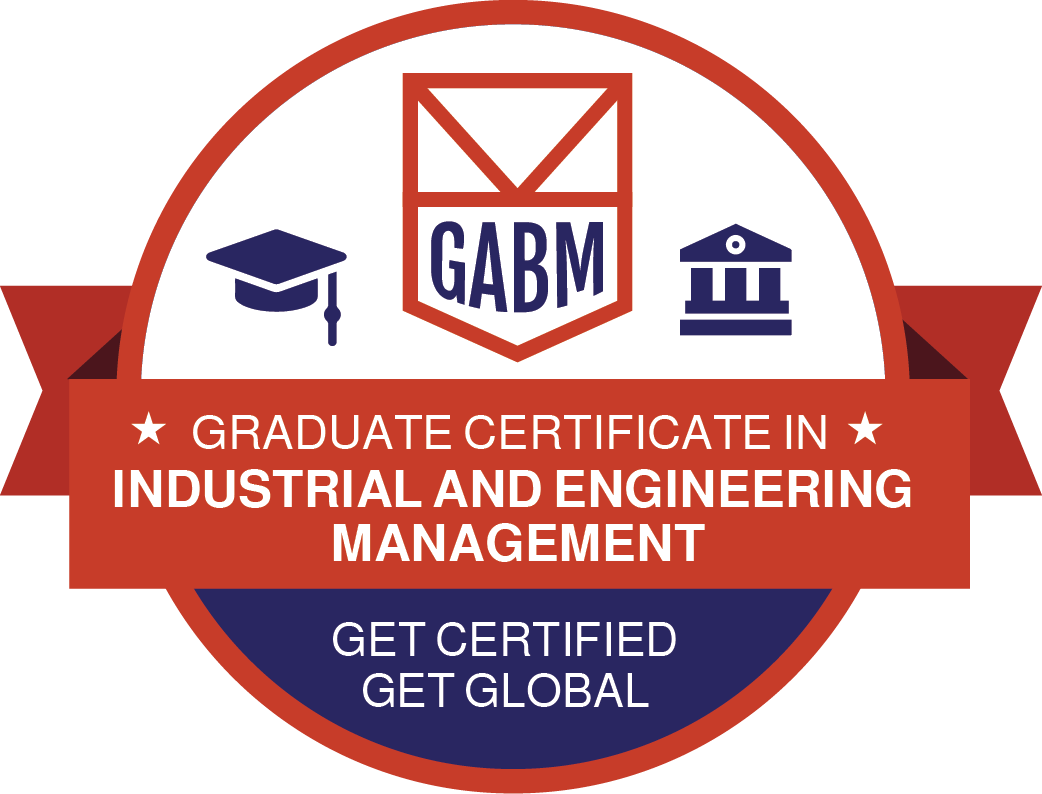
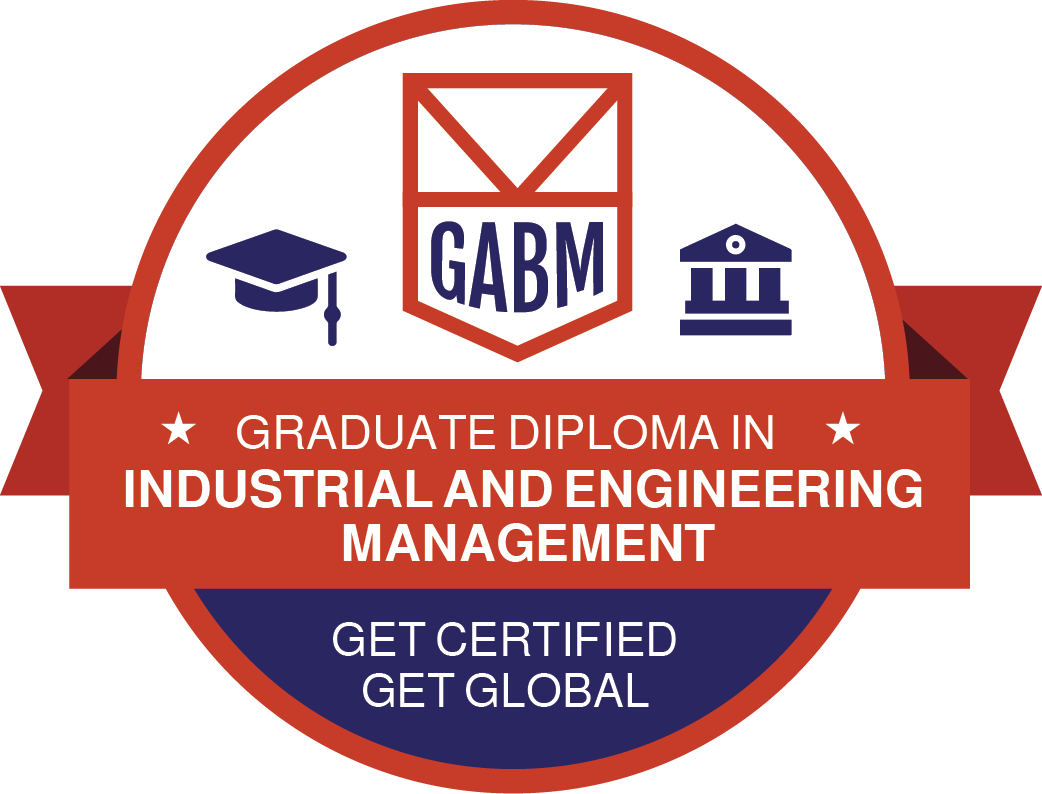
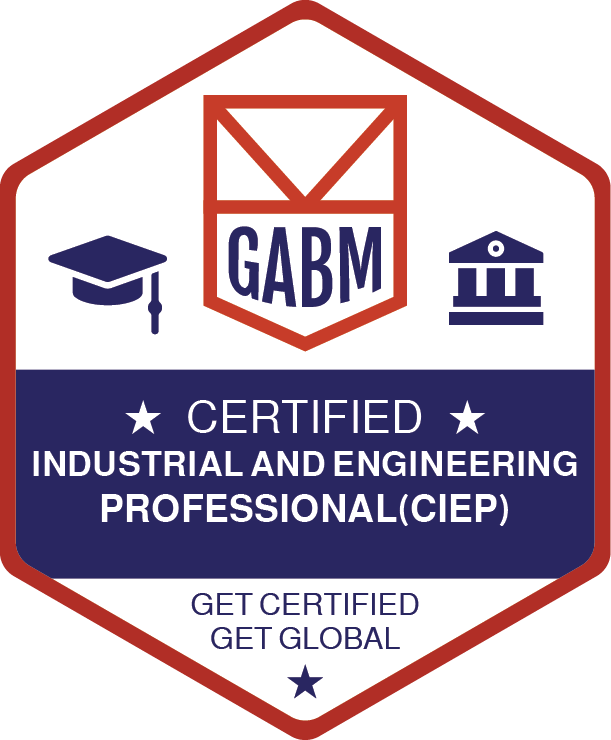
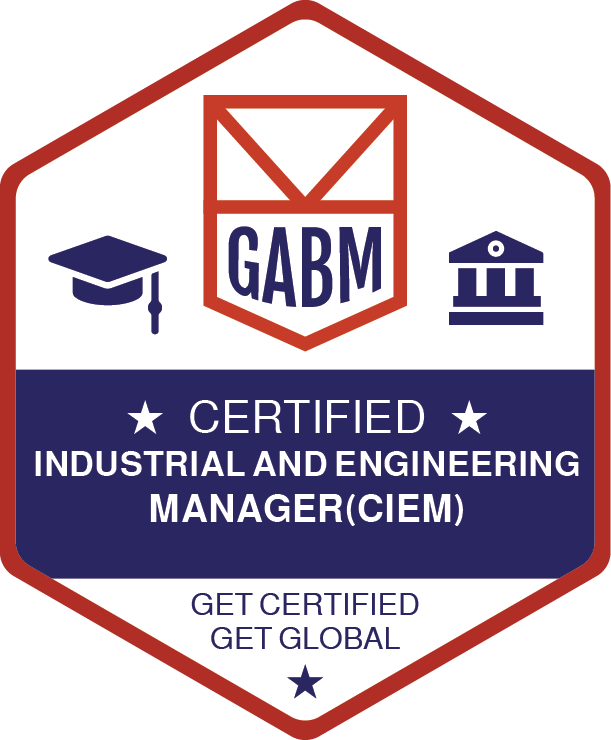
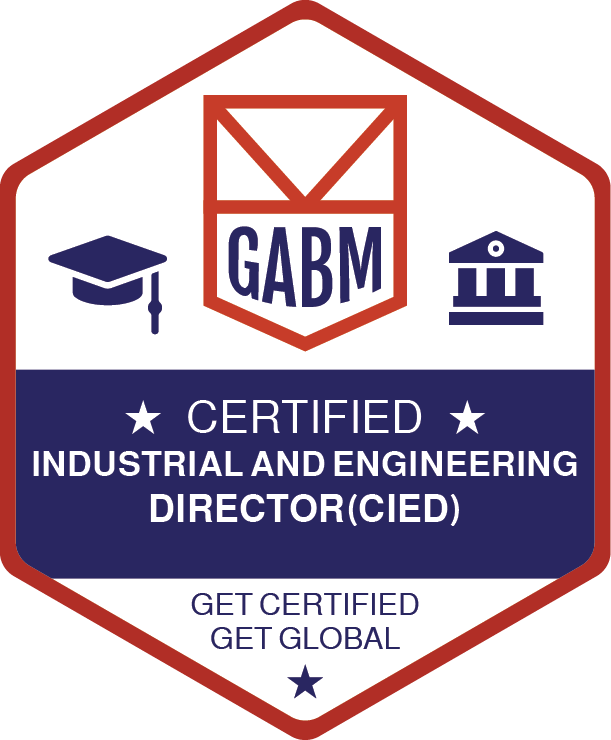
Awards are conferred in accordance with the GABM General and Academic Regulations for Students and the GABM Postgraduate Programme Assessment, Progression and Award Regulations.
Graduate Certificate in
Industrial and Engineering Management
Indian Rupees
Indian Nationals
14,999/-
US Dollars
International
Students
250$
Complete Learning Pack
4-6 Months Access
Graduate Diploma in
Industrial and Engineering Management
Indian Rupees
Indian Nationals
18,999/-
US Dollars
International
Students
300$
Complete Learning Pack
4-6 Months Access
Certified Professional in
Industrial and Engineering Management
Indian Rupees
Indian Nationals
18,999/-
US Dollars
International
Students
300$
Complete Learning Pack
4-6 Months Access
Certified Manager in
Industrial and Engineering Management
Indian Rupees
Indian Nationals
24,999/-
US Dollars
International
Students
350$
Complete Learning Pack
4-6 Months Access
Certified Director in
Industrial and Engineering Management
Indian Rupees
Indian Nationals
29,999/-
US Dollars
International
Students
400$
Complete Learning Pack
4-6 Months Access
Entry Requirements
Entrants to this programme are normally required to have attained the following.
- Applicants should either have at least Secondary school or entry to bachelor degree for
Graduate certificate - Students who have completed bachelor degree / fresher or final year students can apply for
Graduate diploma. - Students who have completed bachelor degree / fresher or final year students can apply for
professional certificate. - Bachelor degree with 2 years’ experience for Managerial certificate.
- Bachelor degree with 2 years’ experience for Managerial certificate.
- Bachelor degree with 5 years’ experience for Director Certificate.
- A good honors degree or equivalent in a relevant subject or and work experience in relevant
management or other related field.
Career Prospect
Alumni of the industrial and engineering management bachelor degree programme are able to carry out for example. Operational analysis, process organization and technical plant maintenance working as production engineers or qualified production engineers assistants. Other fields of work include quality management, supply chain management, innovation management, project management as well as technical procurement, marketing, sales and relevant consulting activities.
- Production industry and
- management
- Metal producing and processing
- Mechanical engineering and plant
- construction
- Power generation
- Material conversion
- Chemicals, chemical products and
pharmaceuticals - Production and processing of food,
luxury foods and beverages. - Information technology
- Robotics
Who Should Attend
- The industrial and engineering management programme is designed for graduates of bachelor programmes in industrial engineering, biotechnology and food engineering, environmental process and energy engineering or mechatronics.
- Graduates of other degree programmes with a substantial amount of technical components may also be admitted
Learning and Training Methods
The Industrial and Engineering management programme uses a number of different assessment techniques that will allow you to demonstrate your understanding of concepts and issues covered. These may be broadly categorized as ‘coursework’ which may be in the form of individual or group assignments, practical problem-solving exercises and presentations.
It should be emphasized that the purpose of assessment is not only grade you, and provide information to facilitate management of the course, but also to provide feedback to you. In this manage it accordingly. You should keep all the returned assessment work in a file as you may have to submit this at the end of the programme for the academy to assess.
Individual model leaders will distribute information on the methods of assessment used, and their weighing at the start of each module.
Programme Curriculam MAP
|
Module / Description |
Graduate Certificate |
Graduate Diploma |
Certified Industrial and engineering Professional |
Certified Industrial and engineering Manager |
Certified Industrial and engineering Director |
|---|---|---|---|---|---|
| Industrial engineering and management science | |||||
| Production and Productivity | |||||
| Organization | |||||
| Product design, planning and development | |||||
| Systems concept, value analysis and plant maintenance | |||||
| Management Concepts | |||||
| Industrial Ownership, Supervisory and leadership | |||||
| Industrial Psychology and Environment pollution | |||||
| Union and industrial ( Labor) relations and labor Legislation | |||||
| Materials, purchase, stores management, Inventory control and management | |||||
| Financial management, Cost accounting and control, Budget and Budgetary Control | |||||
| Job Evaluation, merit rating and wage payment plan | |||||
| Small Scale Industries and entrepreneurship | |||||
| Engineering economics, Professional and business Ethics | |||||
| Assignments | |||||
| Project Report – 100 Points | |||||
| Credit Points |
200 |
260 |
360 |
380 |
380 |
Modules
- Concept of industrial engineering
- History of development of industrial engineering
- Roles of industrial engineer
- Application of industrial engineering
- Production management
- Production management vs Industrial engineering
- Operations management
- Management science – its historic development
- Characteristics of management science
- The tools of management science
- Managerial economics
- Managerial accounting
- Production
- Production function
- Production system
- Input output model
- Microeconomics
- Productivity
- Factors affecting productivity
- Increasing productivity of resources
- Kinds of productivity measures
- Concept of organization
- Importance of organization
- Characteristics of organization
- Elements of organization
- The process of organization
- Organization theory
- Design of organization structure
- Organization chart
- Organization manual
- Types of organization
- Committee
- Project organization
- Matrix organization
- The informal organization
- Organization conflict
- Managerial leadership
- Communication system
- The dynamics of organization
- Introduction to product design
- Effect of design on cost
- Requirements of a good product design
- Factors affecting product design
- Design by imitation
- Product planning
- Product classification
- Product development
- Standardization
- Simplification
- Diversification
- Interchangeability
- System concept
- System analysis
- Systems engineering
- Techniques in system analysis
- Application of systems engineering
- Value analysis engineering
- Value analysis
- Plant
- Maintenance
- Objectives of plant maintenance
- Importance of maintenance
- Duties, functions and responsibilities of plant maintenance engineer
- Organization of maintenance department
- Corrective and breakdown maintenance
- Scheduled maintenance
- Preventive maintenance
- Predictive maintenance
- Plant maintenance schedule
- Standard data for maintenance.
- Management
- Administration
- Organization
- Difference between management, administration and organization
- Characteristics of management
- Management skills
- Managerial objectives
- Harmonization of objectives
- Hierarchy of objectives
- Difference between policies, goals and objectives
- Evolution of development of management thought
- Origins of principles of management
- The beginning of scientific management
- Contributions of F.W. taylor
- Scientific management
- Contributions of Henri fayol
- Contributions of Elton mayo
- Contributions of Gilberth
- Contributions of gantt
- Review of different schools of thought
- Principles of management
- Principles of exception
- Process of management
- Principles of exception
- Process of management
- Functions of management
- Levels of management
- Industrial management
- Types of management
- Management structure/li>
- Need and usefulness of management theory
- Management development
- Introduction to industrial ownership
- Types of ownership
- Single ownership
- Partnership
- Joint stock companies
- Co-operative organization
- Public sector
- Private sector
- Introduction to supervisory and leadership
- Duties and responsibilities of foreman
- Qualities of foreman
- Leadership
- Qualities of good leadership
- Definition and concept of industrial psycology
- Industrial psychology versus personnel management
- Aims and objectives of industrial psychology
- Individual and group
- Individual differences in behavior
- Group dynamics – human behavior under group influence group behavior
- Theory x and y
- Hawthorne experiment
- Morale
- Motivation
- Working, environmental conditions
- Industrial fatigue
- Introduction to environment pollution
- Ecology
- Factors causing / affecting pollution
- Effects of pollution on human health
- Air pollution and control
- Water pollution and control
- Solid waste management
- Noise and its control
- Trade unions
- Industrial relations, definitions and concept
- Trade unions or labor unions
- Industrial disputes
- Strikes
- Lock-out
- Picketing
- Gherao
- Settlement of industrial disputes
- Collective bargaining
- Handling of workers, grievances procedure
- Workers (employees) participation in management
- Union – management relations
- Importance and necessity of labor legislation ( i.e. labor acts)
- Principles of labor legislation
- Types of labor laws.
- Materials management
- Functions of material management
- Purchasing or procurement
- Purchase organization
- Quantity and quality standards
- Accounting
- Stores and material control
- Location and layout of stores
- Receipt and issue of materials
- Store records
- Codification of materials
- Physical verification of stores
- Inventory
- Inventory control
- Inventory classification
- Inventory management
- Inventory control, its objectives and how to achieve them
- Functions of inventories
- Economic order quality
- Inventory models
- ABC analysis
- Material requirement planning (MRP)
- Manufacturing resource planning MRP II
- Operating cycle
- Financial management
- Purpose of investment
- Types of capital
- Working capital
- Sources of finance
- Reserve
- Surplus
- Financial accounting and book keeping
- Assets
- Liabilities
- The journal and the ledger
- Trail balance
- Trading account
- Financial ratios
- Financial statement
- Sources of income
- Capitalization
- Capital structure
- Introduction to cost accounting and control
- Elements of cost
- Prime cost
- Overheads
- Factory cost
- Nature of cost
- Types of cost
- Process cost and cost production
- Allocation of overhead cost I.e., ON cost
- Control and accounting of material, labor and overhead
- Breakeven analysis
- Breakeven chart
- Budget, definition and concept
- Budgeting
- Budgetary control, definition and concept
- The objectives of budgets, budgeting and budgetary control
- Advantages of budget, budgeting and budgetary control
- Limitations of budget
- Types of budget
- Preparation of budget
- Preparation of budget
- Operation (working) of budgetary control
- Introduction to job evaluation
- Definition and concept
- Objectives of job evaluation
- Procedure of job evaluation
- Methods of job evaluation
- Merit rating
- Introduction to wage payment plan
- Incentive
- Wage incentive plans
- Incentives for indirect workers
- Profit sharing
- Introduction
- Role of scope of small scale industries
- Concept of small scale and ancillary industrial undertakings
- How to start a small scale industry
- Procedure for registration of small scale industries
- List of items reserved for exclusive manufacture in small scale sector
- Financial assistance
- Other assistance provided to small units.
- Special incentives
- Assistance to educated unemployed
- Entrepreneurship
- Profile of entrepreneurship
- Entrepreneurial philosophy
- Functions of entrepreneur
- Quality of entrepreneur
- Entrepreneurial failure
- Entrepreneurial development
- Export promotion
- Expectation of entrepreneurship
- Definition and Concept
- Importance of economics for engineers
- Wealth
- Goods
- Wants
- Value and Price
- Capital
- Money
- Income
- Margin
- Utility
- Demand and supply
- The law of substitution
- Supply
- Equilibrium and price determination
- Production
- Factors of production
- Large scale production- characteristics and causes
- Localization of industries
- Laws of returns
- Distribution/li>
- Rent
- Interest
- Profit
- Wages
- Introduction to banks and banking
- Types of banks
- Money market
- Credit/li>
- Stock Exchange
- Speculation – bull and bear
- Principles of taxation
- Direct and indirect taxes
- Income tax
- Free trade and protection
- Foreign exchange
- Mechanism of foreign exchange
- Foreign exchange control
- Insurance
- Life Insurance
- Fire Insurance
- Machinery insurance
- Marine insurance
Program Structure
| Module Code | Module | Core/Elective | Credit Points |
|---|---|---|---|
| IEM-101 | Industrial engineering and management science | Core | 20 |
| IEM-102 | Production and Productivity | Core | 20 |
| FAM-103 | Organization | Core | 20 |
| IEM-104 | Product design, planning and development | Core | 20 |
| IEM-105 | Systems concept, value analysis and plant maintenance | Core | 20 |
| IEM-106 | Management Concepts | Elective | 20 |
| IEM-107 | Industrial Ownership, Supervisory and leadership | Core | 20 |
| IEM-108 | Industrial Psychology and Environment pollution | Elective | 20 |
| IEM-109 | Union and industrial ( Labor) relations and labor Legislation | Core | 20 |
| IEM-110 | Materials, purchase, stores management, Inventory control and management | Core | 20 |
| IEM-111 | Financial management, Cost accounting and control, Budget and Budgetary Control | Elective | 20 |
| IEM-112 | Job Evaluation, merit rating and wage payment plan | Core | 20 |
| IEM-113 | Small Scale Industries and entrepreneurship | Core | 20 |
| IEM-114 | Engineering economics, Professional and business Ethics | Elective | 20 |
| Distinctive features of the Programme | |||
|
|||
Assessment Pattern
The GABM global academy consists of variety of assessment modes.
- Assessed assignments ( in essay , report, problem, case studies or short question format)
- Written examination papers.
- Project report submission.
The exact combination of assessment varies from programme to programme and from module to module.
| Programme | Assessment pattern | Credit Points |
|---|---|---|
| Graduate certificate in Industrial and Engineering Management |
1 Assignment | 200 |
| Graduate Diploma in Industrial and Engineering Management |
2 Assignment | 260 |
| Certified Industrial and Engineering Professional (CIEP) |
3 Assignment | 360 |
| Certified Industrial and Engineering Manager (CIEM) |
3 Assignments with project report | 380 |
| Certified Industrial and Engineering Directr (CIED) |
3 Assignments with project report | 380 |
Note: Assignments and patterns are subject to change without notice; candidates are required to contact office of executive education and professional certification of the academy for respective programme before start of the course.

